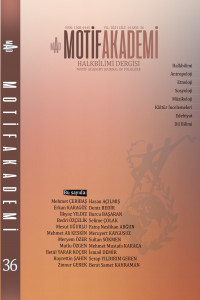TÜRK KÜLTÜRÜNDE “KUT İNANCI” VE “KUT AKTARMA YOLLARI”
KUT BELIEF AND WAYS OF KUT TO TRANSFER IN TURKISH CULTURE
Author(s): Mehmet ÇeribaşSubject(s): Cultural Anthropology / Ethnology, Sociology of Religion
Published by: Motif Halk Oyunları Eğitim ve Öğretim Vakfı
Keywords: Turkish culture; Turkish system of belief; the term kut; kut belief; ways of kut to transfer;
Summary/Abstract: The fact that analysis in depth and properly of the term ‘‘kut’’, which is remarkable in Turkish system of belief and thought, of which semantic framework is rather extensive, which is complicated, and even over which conflicts have occured and that unique classifications and inferences are made on this term; are of great importance in terms of Turkish cultural science. Turkish system of belief which sees Tengri (Blue Heaven) at the topmost of cosmic layers attributes also source of kut to it, and even forms a justification basis, putting forward that this sacred/magical power (kut/mana) which Tengri has is given or transferred to the chosen persons or entities/beings by Tengri again. In order to obtain this kut (mana) which has a sacred and magical quality according to Turkish system of belief, it was supposed to win these powers’ approval, to satisfy them, beg/invoke them, and to receive their consent. For this, it was supposed to conduct certain rites for these powers, offer wows (saçı) or to give sacrifices, and therefore it was becoming to have determine direction of fortune/fate. Turks believed that kut (mana) in sacred and divine beings is given to some persons who were their representative in the Earth, and that this power would be able to be transferred from persons to other person/persons. But, some conditions needed fullfilling so that this power could be transferred. In order for this kut to be transferred, it was supposed to be chosen, to be ethical, to be valiant, to be benevolent, to be helpful, to be brave; in short, to have qualities, knowledge and skills which the blessed beings wanted. Prophets are the leading chosen persons having these features, and followed by kings, khans, religious functionaries. These are followed by persons, such as epic heroes with their braveness and will, delivered to God; saints with their personalities, a moral examplar; occupational sages, a knowledge and skill examplar; ashiks/epical minstrels and folk healers etc. These persons could have indirectly this kut (in secondary way: by taking kut from the one who had taken kut) as well as they could take directly kut from the God. In Turkish culture, by any means, transferring kut paved the way for certain typical ways and methods to occur and these to become stereostyped/cliche over time, too. The leading ways and methods where there was kut transfer are tools and materials such as light (divine light), bade (love, wine), blood, look, touch (taking a hand, giving a hand etc.), saliva, breath, soil, sand, rod (stick/verge) etc. In this study, we will address the term ‘‘kut’’ belonging to Turkish system of belief and thought, and will dwell upon ways of kut to obtain and transfer, as a source of justification.
Journal: Motif Akademi Halkbilimi Dergisi
- Issue Year: 14/2021
- Issue No: 36
- Page Range: 1185-1206
- Page Count: 22
- Language: Turkish

